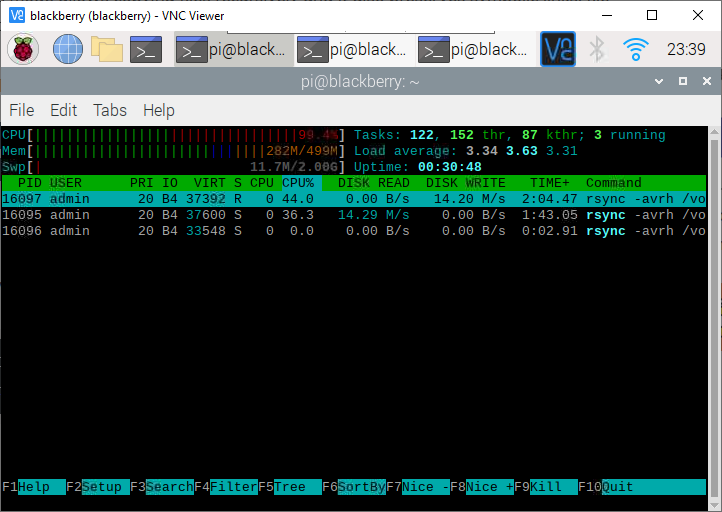A common German saying meaning “no backup, no pity”. Five weeks ago when another ransomware-wave became public and I saw the disaster with the Western Digital network-drives, I realized that despite using a NAS and regularly backing up data from different devices to this RAID level 1-device, I have no real “hard” backup. In my definition: a 1:1 mirror of the NAS-content which is NOT connected to any network at all and also stored physically in a different room or even different flat. Disconnected because of: are you sure everything is secured? Also no hidden bugs? Physically distant because of: what if the NAS catches fire and the backup is also affected?
So I did a quick review of the current state (NAS is a DS213 with latest updates; offers also USB 3.0-interface; has 2 4 TB drives insides, which are filled to 3.5 TB).
Decided to buy a 6 TB external 3.5″-harddrive (not SSD, because of possible loss of data while powered down over years) for 122 € (compared to the price of losing just a fraction of the photos – Forget it!).
Formatted it to EXT4 with some Linux. Attached then to the Synology DS213. And it was not detected, despite saying it supports EXT4. So we let the DS213 format it again (don’t ask me ..).
Let’s say it outright: I don’t want to use their proprietary backup-solutions. I also don’t want any kind of encryption.
SSH’ed into the DS213 (activated before, because off by default). Then I checked which partitions have to be copied. Puzzled together a chained rsync-command (sorted by priorities) and let it run. Detaching the session via ‘nohup’ Wasn’t working.
|
1 2 3 4 5 6 7 |
rsync -avrh /volume1/Photoshare_privat/ /volumeUSB1/usbshare/Photoshare_privat/ && \ rsync -avrh /volume1/homes/Marcel/ /volumeUSB1/usbshare/homes/Marcel/ && \ rsync -avrh /volume1/homes/ruzica/ /volumeUSB1/usbshare/homes/ruzica/ && \ rsync -avrh /volume1/homes/admin/ /volumeUSB1/usbshare/homes/admin/ && \ rsync -avrh /volume1/Camera/ /volumeUSB1/usbshare/Camera/ && \ rsync -avrh /volume1/photo/ /volumeUSB1/usbshare/photo/ && \ rsync -avrh /volume1/Musik/ /volumeUSB1/usbshare/Musik/ |
Turns out quite quickly that the one core-cpu of the DS213 is the bottleneck, because it runs at 100% and therefore mere writing speeds of 8-9 MB/s are achieved despite the HDD being capable of writing up to 120 MB/s. My back of the napkin-estimation is 4-5 days for all data. Next backups should run faster, because incremental. And most of the data is written once, changed almost never.

Quick summary: I was baffled that despite having some experience in IT did not have a _real_ backup before. And out of discussions with peers I know almost none of those working in IT have either.
The proposed solution will save my family and me from any 100% losses.
edit 20210801: ideas need some time to mature. Now one of the Raspberry Pi 3B takes care of the rsync-calls to relieve the real PC (host RocketChat anyway, therefore is online 24/7) and rsync runs now without compression; the resulting writing speed is now in the range of 11-15 MiByte/s.
